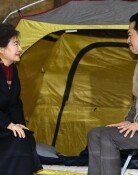[Washingtons Policy on Korean Peninsula] <5 the end> How They View U.S. Forces in Korea.
[Washingtons Policy on Korean Peninsula] <5 the end> How They View U.S. Forces in Korea.
Posted January. 15, 2004 16:26,
I could not help but ask Korean peninsula experts in Washington, especially official authorities of the administration, about the future of the U.S. forces stationed in Korea.
Of course, the two countries have negotiated re-stationing issues of the forces under the name of the Future Alliance Plan, and it has already been settled that Infantry Division of the U.S. forces would be moving below the Han River. However, after President Bush announced again through a special statement on November 25 last year that there will be a transformation in the U.S. forces abroad, questions sprang up in Seoul and Washington about what the Bush administration is thinking.
Further, rumors circulated that it was some kind of warning toward Korea with its president speaking of an independent national defense theory and its delayed decision in sending troops to Iraq.
There were hardly any Korean peninsula experts in Washington that had problems with the transformation of the U.S. forces in Korea as part the international plan of transformation.
However, Robert Galluci, dean of the Walsh School of Foreign Service at Georgetown University, said that the time was not proper and insisted, This is politically insane.
He added, It is appropriate from the aspect that the U.S. forces abroad are working on enhancing their efficiency, but promoting this kind of plan is totally insane when there is this discord regarding the North Korea nuclear issues even within the U.S. administration.
Senior Researcher James Przystup at the National Defense University (NDU) gave a different analysis from the Korean opinions about the fundamental motive of the transformation of the U.S. forces in Korea.
He said, Some people in Korea think that the U.S. is moving the 2nd division to south of the Han River in order to prevent casualties in their forces, which could be another killing field, but this is nonsense. He emphasized, Many Americans are living in Seoul and its surrounding areas, adding, They are the human tripwire.
The U.S.s dogmatism and Koreas ambiguity are both problems. David Steinberg, a professor at Georgetown University criticized, That the U.S. reported the moving the 2nd division to Korea one-sidedly was a dogmatic measure.
Alan Romberg, another progressive researcher, said, The transformation of the U.S. forces is for the efficiency enhancement, and I have been supporting this for a decade so far, but added, It is wrong that the U.S. has given such an [dogmatic] impression in the Korea-U.S. Alliance.
Meanwhile, the Korean peninsula experts in Washington questioned the independent national defense theory of the Roh Moo-hyun government.
Mr. Przystub first said, I still vividly recall former President Kim Dae-jung saying that the stationing of U.S. forces in Korea is very important, and added, What President Roh meant with this independent national defense was not clear. He continued, If President Roh meant that he wanted to break the Korea-U.S. alliance, this is very worrisome. The government needs to clarify their meaning.
The transformation of the U.S. forces and the Korea-U.S. alliance are separate things. An official at the White House said, The Korea-U.S. alliance should be considered now from an international scope. The reorganization of the U.S. forces in Korea was discussed beginning a decade ago and is part of the restructuring of the U.S. forces to react to international threats more efficiently, not a weakening factor in the Korea-U.S. military alliance.
He added, However, considering this is a sensitive issue, they will gradually develop the plan one by one. The U.S.s commitment to the Korea-U.S. military alliance will not change.
An official at the administration actualized the downsizing of the U.S. forces in Korea. However, the official said, The downsizing of the forces is part of the plan to utilize the military strength with high-tech scientific facilities more efficiently and does not mean weakening of the alliance.
In asking whether or not the command during the war will be returned, the official answered, The specific plan or timeline has not be set, and added, We are not excluding any single option, and the U.S. wants an integrated command closely with Korea.
Regarding the issue, Balbina Hwang, a fellow at the Heritage Foundation, said, Even with Bush getting reelected, the downsizing within three years in the future is hard to expect, and even if it does happen, it will happen very progressively. Also, she commented, The downsizing of the armies does not mean a weakening military alliance, but this is not appropriate at the present since there are enough things for North Korea misunderstand, adding, President Bush, Security Advisor Condoleezza Rice and Secretary of State Collin Powell seem to know this well, but what Defense Secretary Donald Rumsfeld is thinking is hard to know.
Jung-Ahn Kim credo@donga.com







